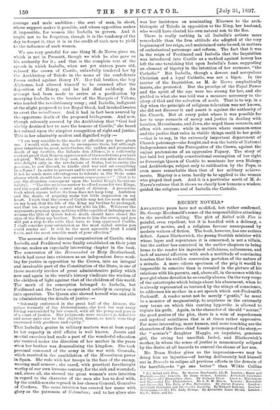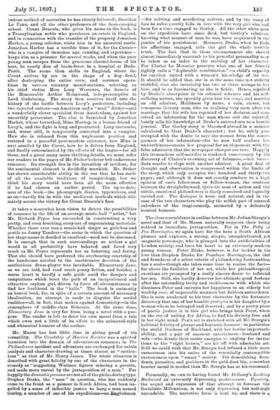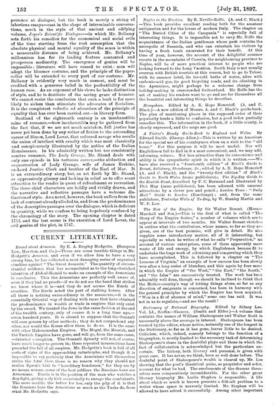RECENT NOVELS.* ADVANCING years have not modified, but rather confirmed,
Dr. George Macdonald's sense of the responsibilities attaching to the novelist's calling. The plot of Salted with Fire is painful, even repellent, but it is handled with a delicacy, a purity of motive, and a religions fervour unsurpassed by modern writers of fiction. The book, however, has one serious defect. James Blatherwick, the young Scottish minister with whose lapse and repentance it is concerned, is not a villain, but the author has contrived in the earlier chapters to bring home to the reader his ingrained selfishness, callousness, and lack of natural affection with such a multitude of convincing touches that his sudden conversion partakes of the nature of a miracle. A more odious specimen of the prig it would be impossible to conceive than is revealed in the picture of his relations with his parents, and, above all, in the scenes with the poor girl whose devotion he so cruelly abuses. On the very verge of the catastrophe which brings about his abasement, when he is already represented as tortured by the stings of conscience, he addresses his mother in a set speech which ont-Pecksniffs Pecksniff. A reader must not be merely "gentle," he must be a monster of magnanimity, to acquiesce in the extremely easy terms on which this canting hypocrite is allowed to expiate his guilt. Again, in the character of the old " sontar," the good genius of the plot, there is a vein of superhuman and mystical saintliness that is at times rather oppressive. Far more interesting, more human, and more touching are the characters of the three chief female personages of the story,— the " sontar's " daughter Maggie, an impulsive, generous girl, the erring but unselfish Isobel, and Blatherwick's mother, in whom the sense of justice is momentarily eclipsed by the desire at all hazards to conceal the shame of her son.
Mr. Bram Stoker gives us the impression—we may be doing him an injustice—of having deliberately laid himself Out in Dracula to eclipse all previous efforts in the domain of the horrible,—to "go one better" than Wilkie Collins
• (1.) Salted with Fire. By Georce Macdonald, LL.D. London : Buret and Blackett.—(2.) Dracu/a. By Bram Stoker. London: Archlbald Comtable and Co.—(3 ) Elementary Jane. By Richard Pryce. Londm : Hutchinson and Co.—(4.) The Philanderers. By A. E. W. MRS1D. London : Macmillan and Co.—(6.) The Folly of Pen Harrington. By Julian Stnrais. London: Archibald Constable and Co.—(6.) Equality. By Edward Bellamy. London: ileinemann.—(7.) The Lady Grange. By Alexander Intim Shand. London : Smith. Elder. and Co. (whose method of narration he has closely followed), Sheridan Le Fenn, and all the other professors of the flesh-creeping school. Count Dracula, who gives his name to the book, is a Transylvanian noble who purchases an estate in England, and in connection with the transfer of the property Jonathan Harker, a young solicitor, visits him in his ancestral castle. Jonathan Harker has a terrible time of it, for the Count— who is a vampire of immense age, cunning, and experience— keeps him as a prisoner for several weeks, and when the poor young man escapes from the gruesome charnel-house of his host, he nearly dies of brain-fever in a hospital at Buda- Pesth. The scene then shifts to England, where the Count arrives by sea in the shape of a dog - fiend, after destroying the entire crew, and resumes opera- tions in various uncanny manifestations, selecting as his chief victim Miss Lucy Westenra, the fiancee of the Honourable Arthur Holmwood, heir-presumptive to Lord Grodalming. The story then resolves itself into the history of the battle between Lucy's protectors, including two rejected suitors—an American and a "mad" doctor—and a wonderfully clever specialist from Amsterdam, against her unearthly persecutor. The clue is furnished by Jonathan Harker, whose betrothed, Mina Murray, is a bosom friend of Lucy's, and the fight is long and protracted. Lucy succumbs, and, worse still, is temporarily converted into a vampire. How she is released from this unpleasant position and restored to a peaceful post-mortem existence, how Mina is next assailed by the Count, how he is driven from England, and finally exterminated by the efforts of the league—for all these, and a great many more thrilling details, we must refer our readers to the pages of Mr. Stoker's clever but cadaverous romance. Its strength lies in the invention of incident, for the sentimental element is decidedly mawkish. Mr. Stoker has shown considerable ability in the use that he has made of all the available traditions of vampirology, but we think his story would have been all the more effective if he had chosen an earlier period. The up-to-date- ness of the book—the phonograph diaries, typewriters, and so on—hardly fits in with the mediwval methods which ulti- mately secure the victory for Count Dracula's foes.
It takes a somewhat keen vision to detect the possibilities of romance in the life of an average music-hall "artist," but Mr. Richard Pryce has succeeded in constructing a very pretty, and even touching, story out of unpromising materials. Whether there ever was a music-hall singer so guileless and gentle as Jenny Tandem—the scene in which the question of her stage-name is decided is excellent—need not be discussed. It is enough that in such surroundings so artless a girl would in all probability have behaved and fared very much as Mr. Pryce represents her as behaving and faring. That she should have preferred the overbearing courtship of the handsome acrobat to the unobtrusive devotion of the meritorious drum-player was inevitable. Elementary Jane, as we are told, had read much penny fiction, and besides, a warm heart is hardly a safe guide amid the dangers and temptations which beset the path of an inexperienced and attractive orphan girl, driven by force of I circumstances to find her livelihood in the "halls." The book is eminently an honest book, for, in spite of a certain amount of necessary idealisation, no attempt is made to disguise the sordid realities—all, in fact, that makes against domesticity—in the atmosphere of middle-class Bohemia. At the same time, Elementary lane is very far from being a novel with a pur- pose. The reader is left to draw his own moral from a tale which owes not a little of its effect to the animated style and whimsical humour of the author.
Mr. Mason has lost little time in giving proof of his versatility. The Courtship of Morrice Buckler was a spirited incursion into the domain of adventurous romance; in The Philanderers incident and adventure are exchanged for subtle analysis and character-drawing at times almost as " meticu- lous " as that of Mr. Henry James. The whole situation is described with great felicity by one of the characters in the comedy as "suggesting Watteau figures mincing a gavotte, and made more unreal by the juxtaposition of a man." For happily the dramatis personx are not all of the philaadering type. Stephen Drake, the " man " in question, who has suddenly come to the front as a pioneer in South Africa, had been im- pelled by a sense of inflexible justice to hang a man named Gorley, a member of one of his expeditions—an Englishman —for robbing and murdering natives ; and by the irony of fate he subsequently falls in love with the very girl who had been for a time engaged to Gorley. All the other white men on the expedition have since died, but Gorley's relatives, knowing what manner of man he was, have acquiesced in the justice of his punishment. Moreover, Drake, when he finds his affections engaged, tells the girl the whole terrible truth. The fact that in these circumstances she should almost immediately succumb to his powerful personality may be taken as an index to the stability of her character. For Clarice Le Mesurier presents what one of her friends rightly calls a "deplorable combination,"—a child's capacity for emotion united with a woman's knowledge of its use. It should be added that she is at the same time not strictly truthful, that she invariably has two or three strings to her bow, and is as fascinating as she is fickle. Hence, repelled by Drake's absorption in his colonial schemes and his self- sufficing nature, she speedily gives him his cone, and marries an old admirer, Mallinson by name, a vain, clever, but venomous literary man, who on realising very soon after his marriage that his wife has repented of her decision and con- ceived an infatuation for the man whose suit she rejected, basely sells his knowledge of Drake's antecedents to a hostile journal. The Gorley story is blazoned abroad in a manner calculated to blast Drake's character ; but he, solely pre- occupied with the desire to save the woman from the conse- quences of her infatuation—for he now half realises her unworthiness—meets her proposal for an elopement with the false admission that the newspaper charges are true. Happily this tremendous self-sacrifice is rendered unnecessary by his discovery of Clarice's crowning act of falseness,—her imme- diate resolve to elope with another admirer. A great deal of thought and observation is compressed within the limits of the story, which only occupies two hundred and thirty-two pages; and although it does not exactly conduce to a high opinion of one's fellow-man or fellow-woman, the contrast between the straightforward, Quixotic man of action and the subtle, emotional philanderers is finely conceived and logically carried out. The dialogue is terse and natural, and in the case of the two characters who play the selfish part of amused onlookers of the tragi-comedy, animated by a delicately ironical humour.
The close resemblance in outline between Mr. Julian Sturgis's novel and that of Mr. Mason naturally suggests their being noticed in immediate juxtaposition. For in The Folly of Pen Harrington we again have for the hero a South African pioneer and explorer, a strong, simple, unsophisticated, yet magnetic personage, who is plunged into the artificialities of London society, and loses his heart to an extremely modern young woman. Peter Blake, however, is far luckier in his love than Stephen Drake, for Penelope Harrington, the idol and foundress of a select coterie of philandering fashionables, has a soul—though she takes some time to realise the fact— far above the futilities of her set, while her philanthropical exertions are prompted by a really sincere desire to befriend her sex. Still, she hardly deserves her ultimate good fortune after the astounding levity and recklessness with which she dismisses Peter and entrusts her happiness to an elderly but wealthy roué, of impeccable manners but dubious antecedents. She is soon awakened to his true character by the fortunate discovery that one of her humble protegees is his daughter by a woman whom he betrayed and deserted ; and by a pretty piece of poetic justice it is this girl who brings back Peter, when on the eve of sailing for Africa, to find his divinity free and in her right mind. Pen's set is sketched with all Mr. Sturgis's habitual felicity of phrase and fantastic humour : in particular the stolid Duchess of Buckland, with her bovine imperturb- ability, and a pair of amateur entertainers—husband and wife—who devote their entire energies to angling for invita- tions to the "right houses," are hit off with admirable art. Still we could wish that Mr. Sturgis had infused a little more earnestness into his satire of the essentially contemptible excrescences upon " smart " society. For demolishing dece- dents, parasites, and grubbers in the gold-dust bin, somewhat heavier metal is needed than Mr. Sturgis has at his command.
Personally, we own to having found Mr. Bellamy's Looking Backward an extremely depressing performance. Equality, the sequel and expansion of that attempt to forecast the Socialistic Millennium, is not only depressing but well-nigh unreadable. The narrative form is kept up, and there is a pretence at dialogue, but the book is merely a string of laborious essays—cast in the shape of interminable conversa- tions, much in the style of that ancient and edifying volume, Joyce's Scientific Dialogues—in which Mr. Bellamy sets forth his remedies for the economical and social evils of the time starting from the root assumption that the absolute physical and mental equality of the sexes is within a measurable distance of being achieved. Mr. Bellamy's millennium has for its leading feature contented and prosperous mediocrity. The emergence of genius will be impossible : literature will have ceased to exist : men will adopt the bloomer costume, and the principle of the paper- collar will be extended to every part of our costume. Mr. Bellamy is evidently very much in earnest, and must be credited with a generous belief in the perfectibility of the human race. As an exponent of his views he lacks distinction of style, and he is destitute of the saving grace of humour. We cannot resist the conclusion that such a book is far more likely to sicken than stimulate the advocates of Socialism. It is the completest reductio ad absurdum of the principle of equality that has ever been carried out—in literary form.
Scotland of the eighteenth century is an inexhaustible mine of romance,—how inexhanstiblo may be gathered from the fact that, if we are not much mistaken, fall justice has never yet been done by any writer of fiction to the astounding career of Simon, Lord Lovat, that cultured savage who recalls the union of intellect with cruelty which was most classically and conspicuously illustrated by the nobles of the Italian :Renaissance. In his admirably written but too consistently sombre romance, The Lady Grange, Mr. Shand deals with -only one episode in his tortuous career,—the abduction and sequestration of Lady Grange, wife of James Erskine, ex-Lord Justice Clerk and brother of the Earl of Mar. It is an extraordinary story, but, as set forth by Mr. Shand, so oppressively gloomy and lacking in relief as to offer scant attraction to the reader in quest of refreshment or recreation. 'The three chief characters are boldly and vividly drawn, and the narrative and reflective passages have a welcome dia. tinction of style. As a novel, however, the book suffers from the lack of contrast already alluded to, and from the predominance of the descriptive passages over the dialogue, which is deficient in quantity, while we confess to being hopelessly confused by the chronology of the story. The opening chapter is dated 1753, and the last scene is the execution of Lord Lovat, the savil genius of the plot, in 1747.








































 Previous page
Previous page